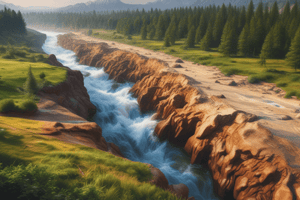Podcast
Questions and Answers
What is the main agent responsible for shaping our planet's landscape through natural processes?
What is the main agent responsible for shaping our planet's landscape through natural processes?
- Water erosion (correct)
- Glacial erosion
- Wind erosion
- Volcanic eruption
Which of the following is NOT a consequence of water erosion?
Which of the following is NOT a consequence of water erosion?
- Deepening riverbeds
- Widening river channels
- Carving new meanders
- Formation of glaciers (correct)
What are the two main forms of river erosion discussed in the text?
What are the two main forms of river erosion discussed in the text?
- Wind erosion and volcanic activity
- Glacial erosion and sediment deposition
- Hydraulic action and physical abrasion (correct)
- Chemical corrosion and biological action
How do rivers contribute to dynamic environments according to the text?
How do rivers contribute to dynamic environments according to the text?
What role do boulders, pebbles, and large particles play in river erosion?
What role do boulders, pebbles, and large particles play in river erosion?
Why is water erosion considered crucial along rivers?
Why is water erosion considered crucial along rivers?
What is one of the impacts of soil loss due to water erosion?
What is one of the impacts of soil loss due to water erosion?
How does sedimentation impact aquatic life?
How does sedimentation impact aquatic life?
What can happen when eroded slopes become unstable?
What can happen when eroded slopes become unstable?
Why is managing water erosion important in regions with high susceptibility to it?
Why is managing water erosion important in regions with high susceptibility to it?
Which strategy can help in addressing the challenges of water erosion according to the text?
Which strategy can help in addressing the challenges of water erosion according to the text?
What type of modifications can continuous water erosion cause according to the passage?
What type of modifications can continuous water erosion cause according to the passage?
Flashcards are hidden until you start studying
Study Notes
Water Erosion: Unveiling River's Transformational Force
Water is a powerful agent responsible for shaping our planet and its landscape through various natural processes. One such phenomenon is water erosion, which occurs when running water loosens soil particles from land surfaces and transports them away. This process plays a crucial role, especially along rivers where it contributes significantly to their evolution and ecosystem dynamics. Let's delve into these aspects in more detail.
River Erosion
Rivers constantly carve out new channels, widen existing ones, and deepen riverbeds over time due to two main forms of river erosion – hydraulic action and physical abrasion. Hydraulic action refers to the force exerted by flowing water against solid structures like rock banks and loose sediments, while physical abrasion arises from boulders, pebbles, and other large particles carried by rivers grinding against bank materials. As this interplay between water and earth continues, rivers alter their courses, form new meanders, and sculpt unique features, contributing to dynamic environments essential for diverse plant and animal life.
Effects of Water Erosion
The consequences of water erosion can vary across scales, affecting everything from local landscapes to global ecosystems and human activities. Some impacts of water erosion include:
-
Soil loss: When topsoil washes downstream, productivity decreases in agricultural areas, causing food shortages and economic hardship.
-
Flooding: Accumulation of eroded material in riverbanks leads to increased stream flow capacity during heavy rainfall events, increasing flood risks.
-
Sedimentation: Deposition of fine particles carried by rivers often clogs reservoirs and irrigation systems, degrading water quality and negatively impacting aquatic life.
-
Landslides: Eroded slopes become unstable under gravity, leading to landslide occurrences and further intensifying water erosion.
-
Geomorphic changes: Continuous water erosion results in fluvial geomorphology modifications – from subtle adjustments like meander cutoffs to dramatic transformations like delta formation.
These impacts underscore the importance of managing water erosion effectively, particularly in regions with high susceptibility, including drylands, mountains, and steep hillslopes. Strategies for addressing these challenges range from structural measures like terracing, contour farming, and riparian buffer strips to holistic approaches encompassing watershed management practices, reforestation efforts, and sustainable agriculture techniques. By understanding and mitigating water erosion, we secure both environmental health and socioeconomic wellbeing.
Studying That Suits You
Use AI to generate personalized quizzes and flashcards to suit your learning preferences.




